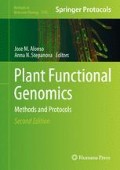Abstract
Molecular cloning is a vital step in much of today’s plant biological research. Particularly, when a species is amenable to transgenic manipulation, cloning enables detailed study of gene and protein function in vivo. Therefore, accurate, consistent, and efficient cloning methods have the potential to accelerate biological research. Traditional restriction-enzyme/ligase-based strategies are often inefficient, while novel alternative methods can be less economical. We have recently optimized a method for Ligation-Independent Cloning (LIC) that is both efficient and economical. We have developed a large set of LIC-compatible plasmids for application in plant research. These include dedicated vectors for gene expression analysis, protein localization studies, and protein misexpression. We describe a detailed protocol that allows the reliable generation of plant transformation-ready constructs from PCR fragments in 2–3 days.
Access this chapter
Tax calculation will be finalised at checkout
Purchases are for personal use only
References
De Rybel B et al (2011) A versatile set of ligation-independent cloning vectors for functional studies in plants. Plant Physiol 156(3):1292–1299
Tabor S, Struhl K (1989) DNA-dependent DNA polymerases. In: Ausebel FM et al (eds) Current protocols in molecular biology. John Wiley & Sons, Inc, New York
Li MZ, Elledge SJ (2007) Harnessing homologous recombination in vitro to generate recombinant DNA via SLIC. Nat Methods 4(3):251–256
Eschenfeldt WH et al (2009) A family of LIC vectors for high-throughput cloning and purification of proteins. Methods Mol Biol 498:105–115
De Rybel B et al (2012) A role for the root cap in root branching revealed by the non-auxin probe naxillin. Nat Chem Biol 8(9):798–805
De Rybel B et al (2013) A bHLH complex controls embryonic vascular tissue establishment and indeterminate growth in Arabidopsis. Dev Cell 24(4):426–437
Hellens RP et al (2000) pGreen: a versatile and flexible binary Ti vector for Agrobacterium-mediated plant transformation. Plant Mol Biol 42(6):819–832
Author information
Authors and Affiliations
Corresponding author
Editor information
Editors and Affiliations
Rights and permissions
Copyright information
© 2015 Springer Science+Business Media New York
About this protocol
Cite this protocol
Wendrich, J.R., Liao, CY., van den Berg, W.A.M., De Rybel, B., Weijers, D. (2015). Ligation-Independent Cloning for Plant Research. In: Alonso, J., Stepanova, A. (eds) Plant Functional Genomics. Methods in Molecular Biology, vol 1284. Humana Press, New York, NY. https://doi.org/10.1007/978-1-4939-2444-8_21
Download citation
DOI: https://doi.org/10.1007/978-1-4939-2444-8_21
Published:
Publisher Name: Humana Press, New York, NY
Print ISBN: 978-1-4939-2443-1
Online ISBN: 978-1-4939-2444-8
eBook Packages: Springer Protocols

